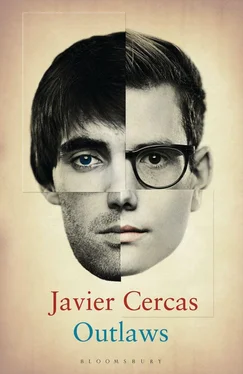‘And you believed your story with Tere was similar?’
‘It’s not that I believed it: it’s that it struck me as obvious. And not that it was similar: it was even worse. More ridiculous. More humiliating. I suddenly felt that everything fell into place: Tere was Zarco’s girlfriend when I met her, in the Vilaró arcade, she still was while Zarco’s myth grew up in the prisons and she probably still was now, when he himself had destroyed or degraded his own myth and now knew for sure that he would never live in freedom again. That didn’t mean Tere hadn’t loved me, or that she hadn’t been in love with me when we used to see each other at my place to make love and listen to old CDs, or even that she hadn’t been during the summer of ’78, like Zarco and she herself claimed. Why wouldn’t she have been? Who can say that in her own way Redondo’s lover wasn’t in love with him? Women are like that: they turn their interests into feelings; they always have and they always will, at least as long as they’re weaker than us. So no, that didn’t mean that Tere hadn’t loved me: it just meant that she’d loved me in an occasional and conditional way, while she loved Zarco in a permanent and unconditional way. It meant that probably everything or almost everything Tere had done with me she’d done for Zarco: in the washrooms of the Vilaró arcade she’d seduced me because Zarco needed to recruit me, and that same summer, as you suspected, she’d seduced me again on Montgó beach to get even with Zarco, who was sleeping with another girl that night; and at my place on La Barca she’d seduced me again, twenty years later, because she wanted to make sure I’d work conscientiously to get Zarco out of prison and, when Zarco started to get out on release, brushed me off so I wouldn’t bother them, but she used her wiles to keep hold of me, although at a distance, so I wouldn’t abandon them before Zarco was freed and she could run away with him. . It all fell into place. And worst of all I felt that I’d always known the truth and at the same time had never wanted to know it, that it was such an obvious truth that neither Tere nor Zarco had bothered much about hiding it from me, and that, precisely for that reason, I’d been able to ignore it or pretend I didn’t know. I understood Tere’s attitude that night in La Creueta, trying to get Zarco to shut up when, drunk and drugged up, he let off steam and almost let out the brutal truth and called me a dickhead and a wanker and said that the two of them were using me and that I didn’t understand anything. I understood the irony of two professional sharks like Redondo and I falling for such an old and well-known trick. I understood Redondo’s horror when he discovered the snare he’d fallen into and immediately started planning to imitate him by leaving the practice in the hands of Cortés and Gubau and abandoning the city for a good long while. And I understood that the great misunderstanding of my life was that there hadn’t been any misunderstanding.’
‘So you did as Redondo had done? You dropped everything and left?’
‘No, I didn’t leave. I stayed, not because I wanted to but because I didn’t even have the energy to leave. What happened was I went to a doctor who diagnosed depression, and for more than a year I underwent psychiatric treatment and a massive diet of antidepressants and anti-anxiety medication. As time passed, I began to recover gradually: I continued in treatment and, although I didn’t give up the psychotropics, I reduced the doses and managed to return to work and more or less resume my old life. It’s true that during that period I felt like some sort of survivor, but it’s also true that I began to think with increasing frequency that the worst was over and that, since I’d already made all or almost all the mistakes a person can make, what I did from there on in I could almost only get right. It was naive: I’d simply forgotten that, no matter how bad things got, they could always get much worse.’
‘Does that mean you heard from Zarco?’
‘Bingo. One day in May or June of 2004, almost three years after seeing him for the last time at the gates of the Gerona prison, I received a letter from him. It was the first sign of life I’d had from him since the press reported his final arrest. The letter came from the Quatre Camins prison and was written by hand, with careful rounded handwriting and in the formal tone of a request; I read it twice: the first time I thought Zarco was using that handwriting and that tone to impose a professional distance between us (or perhaps to tell me without saying so that he was annoyed with me for all the time I’d wanted nothing to do with him); the second time I guessed that he used them because they were the only ones he knew. Zarco began with an overly formal salutation, and then immediately asked me to be his lawyer again; then he gave the reasons for his request: he stated that days earlier, in the prison yard, a skinhead had given him a beating that had left him almost unconscious and that, while they were transporting him to the emergency room of Terrassa General Hospital, two members of the Catalan police force had stopped the vehicle, made him get out and brutalized him. Now he was back at the prison, isolated from the rest of the inmates in a hospital unit, and he wanted me to denounce the two beatings; as well as taking charge of this case, he also wanted me to defend him against a charge of insubordination, and most of all he wanted me to start proceedings to get him readmitted to Gerona Prison and do whatever necessary to get them to accept him. At the end of his letter, Zarco managed to wrench a pitiful note out of his orthopaedic handwriting and inform me that he was ill, begging me to help him through this rough patch and asking me to get in touch with Tere so she could bring me up to date and fill me in on the details.
‘I don’t know if I finished rereading Zarco’s letter more furious than incredulous or more incredulous than furious. It was like a message from an alien. I thought it was incredible and infuriating that, after having cost me two years of work and having betrayed my trust and that of all those who had supported the campaign for his liberty, he didn’t offer the slightest excuse or show the slightest sign of remorse. I thought it was incredible and infuriating that he showed no sign of feeling guilty, or even of remembering his own outrages, and instead was still trying to present himself as a victim. Most of all I thought it was incredible and infuriating that, after having deceived me and making Tere deceive me, having treated me like a dickhead and a wanker and having forced me to make a fool of myself, he would still come to me using the same old bait and believing I would bite for a third time (although I couldn’t help but notice that the letter didn’t contain Tere’s address or phone number, so I could get in touch with her). All this meant that I didn’t feel the slightest pity for him or the slightest cordial impulse towards him or his situation; just the reverse: I knew that ninety-five per cent of my feelings of absolute futility and drought and desiccation and failure that had dragged me into depression should be attributed to Tere’s deceit and her having left me, but at that moment I realized that the remaining five per cent should be attributed to my absurd attempt to take responsibility for the actions of someone who didn’t take responsibility for his own actions and to save someone who deep down didn’t want to save himself; and I also realized that the best thing I could do would be to stay away from him. From him and from Tere. The result of this reflection was that I didn’t even answer Zarco’s letter. And the result of this result was that I suddenly felt buoyant and independent, as if someone had just taken a lead collar I didn’t know I was wearing off my neck.
Читать дальше












